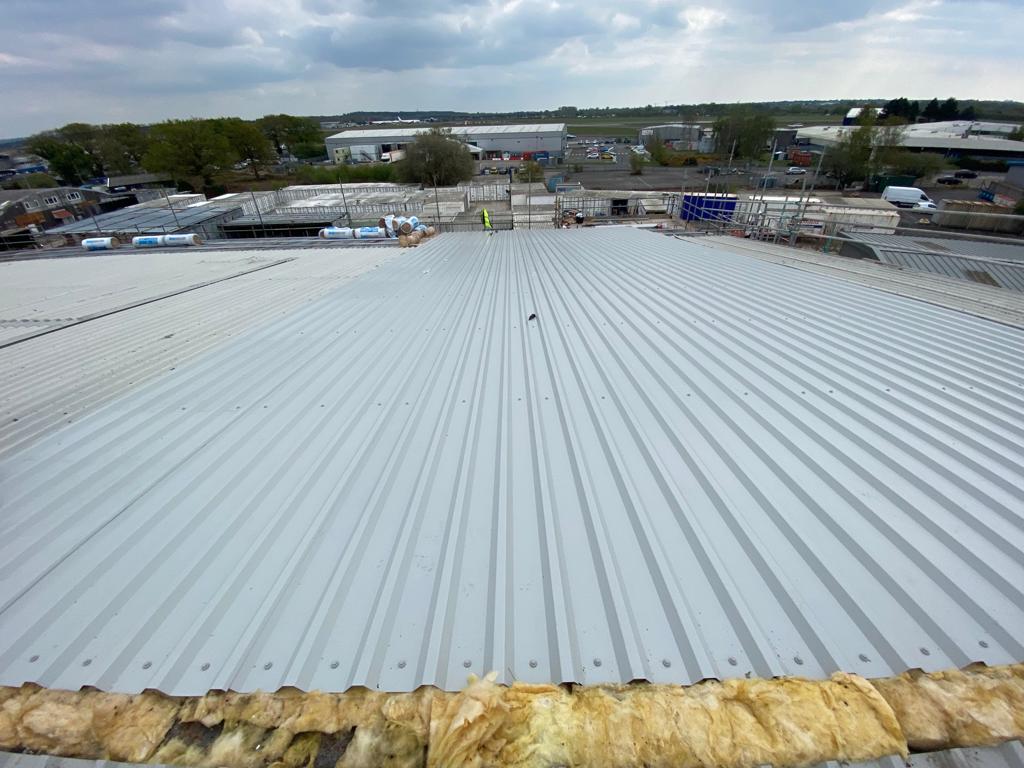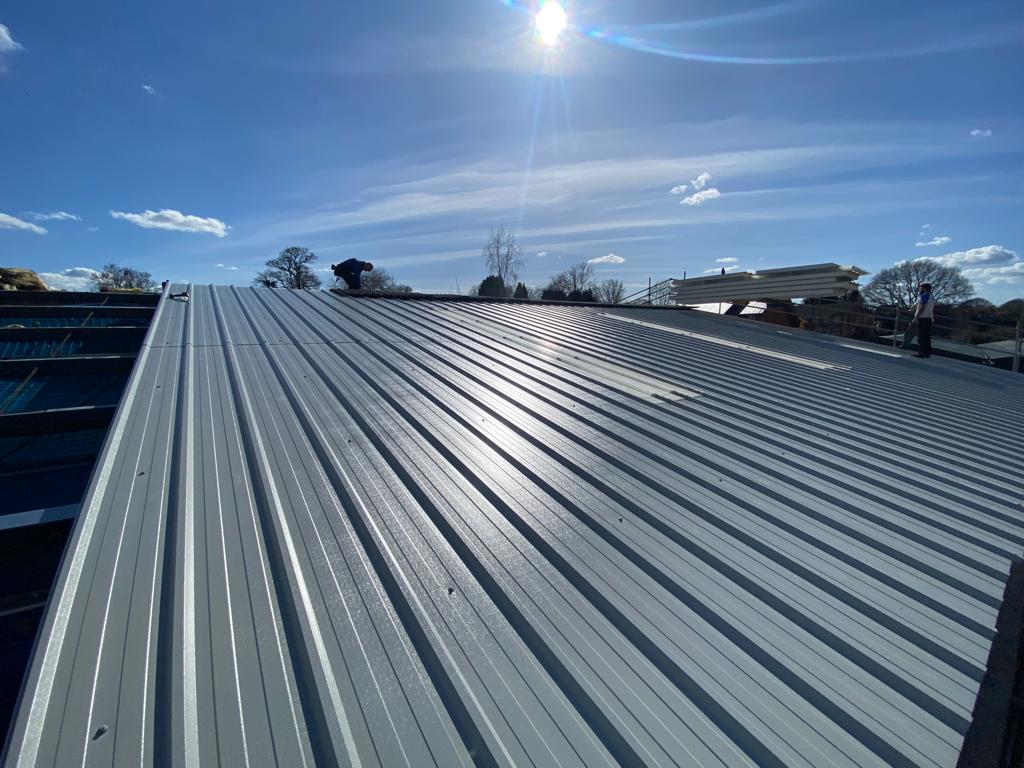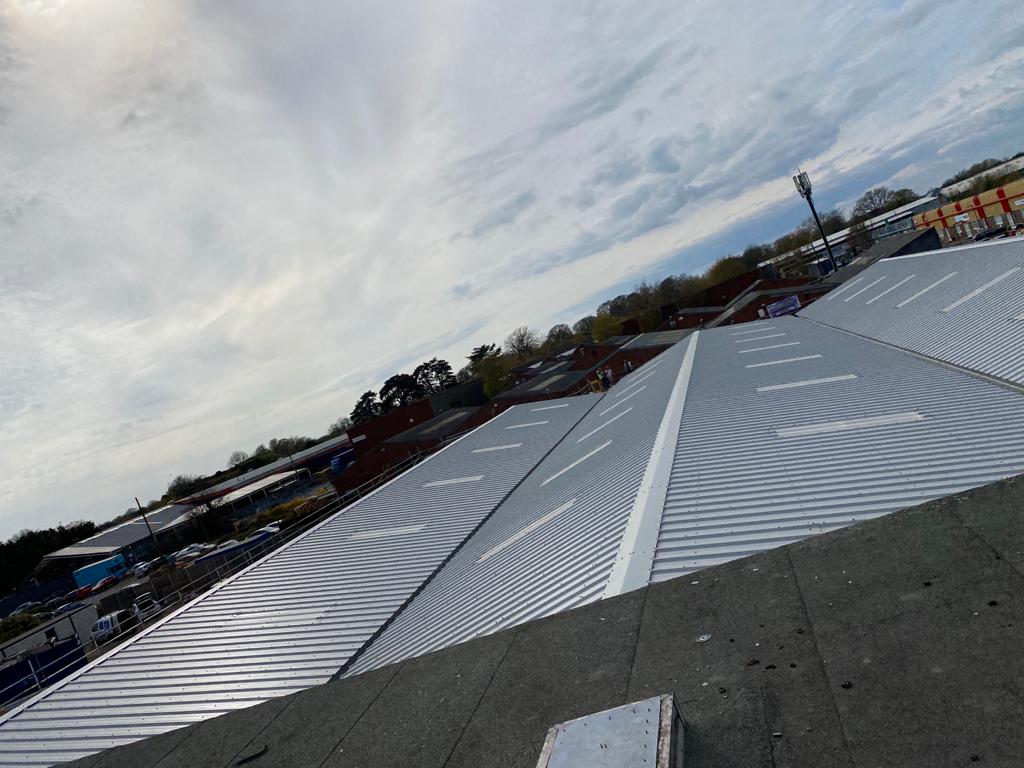Close
Home > New Builds

Finn Industrial Roofing is the premier roofing company for new industrial roof installations, design and maintenance across Dorset and the South-West.
As a leading industrial roofing contractor in Dorset, we pride ourselves on the quality of our roofing services and guarantee job satisfaction with our workmanship guarantee and 10-year manufacturer guarantees. Technical and CAD Drawings available on request. The friendly team are always happy to answer any questions or concerns you have with your commercial/industrial roof.
With over 20-years’ experience in the roofing and construction industry, our experienced team has amassed a range of completed new builds and new roofs, as well as glowing reviews and praise from previous clients. Regardless of your project size, timelines or budget, the team have the experience and skills to make your project a success.
"For the past three years Finn roofing has been our only sub contractor that we use. They have under taken many projects for us including the complete remodelling of our largest site. They are professional and reliable and would recommend many times over.
CAD (Computer-Aided Design) drawings are essential at the design stage of any new build industrial roofing project. These detailed digital plans allow our architects, engineers and roofers to visualise the dimensions and details, these include structure, drainage, fixings, insulation layers and integration with other building systems.
With extensive experience in the industrial roofing sector, we recognise how vital it is for each new build roofing system to be tailored for its intended use – ie. manufacturing operations, warehousing or logistics facilities all need very different strategies.
At Finn Industrial Roofing, we have a track-record for delivering large-scale industrial roofing solutions. Our rusted suppliers and robust infrastructure enabling us to handle both new builds, refurbishments and new installation projects with efficiency and precision.
The team manage the entire process, from early design stages right through to final handover, ensuring a smooth, fully supported journey from start to finish.
See what customers are saying about our services
We work around your schedule to survey, repair or install your roof
The structural backbone of most industrial buildings, supporting both the roof and walls. In roofing, it provides the framework upon which purlins and cladding systems are mounted.
The steel frame must be precisely engineered to handle roof loads (including wind, snow, and equipment) and it plays a direct role in determining roof pitch, span, and fixing methods.
Finn Industrial Roofing has built a strong name across Dorset and the South-West for delivering reliable and high-quality roofing installations. Our end-to-end service includes comprehensive project management, supported by essential safety measures such as:
Finn Industrial Roofing hold leading industry accreditations and back all our work with robust guarantees, such as a 10-15 year material guarantee. Clients also benefit from our insurance-backed warranties, providing complete peace of mind and long-term assurance.





Widely used in modern new build industrial roofs for their insulation performance and speed of installation. These panels consist of an insulation core (usually PIR or mineral wool) sandwiched between two sheets of profiled metal. In roofing, composite panels serve both as weatherproof covering and thermal envelope, helping buildings meet Part L regulations.
We’re committed to delivering top-tier roofing solutions by using only premium-grade materials and the most up-to-date installation techniques. Our team is highly trained and equipped to fit a wide range of roofing systems to exceptional standards, ensuring lasting performance and reliability.
We continually stay informed of the latest developments in commercial roofing, enabling us to adopt the most effective methods and technologies. Partnered with the UK’s most trusted and reputable suppliers we ensure every new roof is built to meet the highest industry benchmarks.
Maintenance is relatively straightforward, and repairs can be easily made by patching. Its reflective surface also helps to reduce heat absorption, aiding energy efficiency in larger facilities. While puncture resistance can be a concern in high-traffic areas, protective walkway layers can be added.
Single ply roofing systems are made from flexible sheets of synthetic polymer that are applied in a single layer. These membranes, such as TPO, PVC or EPDM, are lightweight and ideal for flat or low-pitched roofs. The material is typically bonded to the substrate using mechanical fastening, adhesive, or ballasting. Single ply offers excellent resistance to UV rays and chemicals, and is known for being quick to install, making it an efficient choice for large-scale industrial builds or refurbishments with tight timelines.
Overall, single ply systems are a cost-effective and practical option for modern industrial buildings seeking a lightweight, durable and efficient roofing solution.
Metal roofing is a popular choice for industrial properties thanks to its longevity, strength, and weather resistance. Common materials include galvanised steel, aluminium, and sometimes zinc. These roofs can be installed as standing seam systems or corrugated sheets, both of which offer strong structural performance. Metal roofs are fire-resistant, require minimal maintenance and can last 40 years or more if properly maintained.
They are especially suited to large warehouses and factories where durability and low upkeep are priorities. Insulation layers are typically added beneath to control temperature and minimise noise.
While initial costs can be higher than some systems, long-term savings in reduced maintenance and extended lifespan often make metal roofing a sound investment for industrial applications.
Slate roofs bring a traditional, durable finish to buildings, often used where appearance is as important as function. Though more commonly found on heritage or architecturally sensitive properties, slate can be adapted for certain industrial buildings, particularly in rural or conservation areas.
Slate is a natural stone product that offers exceptional resistance to weather and fire, with a lifespan that can exceed 100 years.
However, slate is one of the heaviest roofing materials and requires a strong supporting structure. Installation is labour-intensive and demands skilled tradespeople, which increases cost. While not typically the first choice for large industrial estates, slate remains valuable for specific buildings where aesthetic or planning requirements call for a traditional look without compromising durability.
Tiled roofs are generally associated with residential buildings but can also be found in smaller industrial premises, offices, or mixed-use developments. Clay or concrete tiles offer good weather resistance and longevity, often lasting over 50 years. Tiles come in various profiles and finishes, making them suitable where visual appeal is desired.
Tiles are relatively easy to repair if individual units are damaged, but they are heavier than metal or single ply alternatives and can be prone to breakage from impact or foot traffic.
They are not ideal for very low-pitched roofs. Tiled systems are best suited for smaller industrial units, business parks, or developments where appearance plays a part alongside practicality.
Built-up felt roofing, also known as bituminous felt, has been a longstanding choice for flat and low-pitched roofs across the UK.
This system involves multiple layers of bitumen-based felt, which are bonded together using hot or cold methods. The layers create a robust, waterproof membrane that provides good durability and resistance to foot traffic and weather conditions.
Modern built-up systems often include a cap sheet with mineral finish for added protection. These roofs are cost-effective and relatively easy to repair or overlay, making them ideal for refurbishments or when budgets are tight.
Liquid applied roofing systems offer seamless waterproof protection by being applied as a cold liquid, which then cures to form a rubber-like membrane. These systems are ideal for complex roof shapes, awkward detailing, or areas where traditional membranes might struggle.
They adhere to a range of surfaces, including concrete, metal, asphalt and wood, and are commonly used for refurbishment projects.
Each roofing system has its own merits and is best suited to different types of industrial jobs. For example, single ply and liquid applied systems are ideal for flat roofs and quick-turnaround projects, offering efficiency and ease of installation. Whereas, metal roofs are the go-to for strength, lifespan and performance in warehouses and manufacturing plants.
Best practice involves matching the roofing system to the structure’s function, location, and long-term maintenance expectations. We consider factors such as budget, exposure and building use when fitting a new roof on any industrial building.



Standing seam roofing systems are high-performance metal roofs commonly used in new builds that demand sleek design and superior weather protection. The panels are joined with raised interlocking seams, allowing thermal movement while preventing water ingress.
These systems are especially popular for curved or long-span roofs and can be installed over insulation boards on a steel deck. In new builds, standing seam systems offer durability, low maintenance and clean architectural lines, often used on premium industrial and commercial projects.
Our team of certified roofing professionals delivers high-quality installations, refurbishments, and maintenance solutions tailored to your needs, across Dorset and the South-West. With extensive experience across all types of industrial roofing and cladding, the team can also schedule regular maintenance after your roof has been installed, to ensure it is kept in the best shape possible.
We recognise that no two industrial roofing projects are alike, which is why we take a tailored approach to every job. By consistently meeting recognised industry standards and focusing on long-term performance, we provide cost-effective, reliable roofing services that deliver real value.
A double skin roof system consists of an inner and outer profiled metal sheet with layers of insulation packed between. These are used as an alternative to composite panels in industrial new build roofs, offering more flexibility in terms of insulation types and thickness.
What types of roofing systems do you offer for new industrial builds?
We provide a full range of roofing systems tailored to suit different industrial applications. These include single ply membranes, metal roofing, standing seam systems, built-up felt, liquid applied coatings, as well as slate and tiled roofs where appropriate. Each system is selected based on the building’s function, budget, and design requirements.
Do you offer full design support for new builds?
Yes, we offer full technical support, including Computer-Aided Design (CAD) drawings, to help visualise your project before construction begins. These detailed plans include roof layout, insulation, drainage systems and integration with the steel framework, allowing precise execution on site.
What is a steel frame and why is it important in industrial roofing?
The steel frame acts as the structural core of most industrial buildings, supporting both the roofing and cladding systems. It’s designed to withstand load stresses such as wind and snow while ensuring the stability and longevity of the entire roof structure.
What are composite roof and wall cladding panels?
Composite cladding panels are made of two metal sheets bonded to a central insulation core, typically PIR or mineral wool. These panels offer excellent thermal efficiency, quick installation, and are ideal for new builds needing to comply with energy regulations like Part L.
Are standing seam roofs suitable for all industrial properties?
Standing seam systems are ideal for modern industrial buildings where aesthetics and performance are equally important. They offer excellent weather protection and flexibility, especially for curved or long-span roofs, and are often specified for premium commercial or industrial projects.
What are double skin systems and how do they differ from composite panels?
Double skin systems use separate inner and outer metal sheets with insulation layers in between, allowing greater flexibility in insulation type and thickness. Unlike composite panels, which are factory-bonded units, double skin systems are assembled on-site and can be tailored more precisely to project specifications.
Can you work on both large and small industrial roofing projects?
Absolutely. With over 20 years of experience, our team is equipped to handle new builds of all sizes, from large warehouses to smaller commercial units. We offer a fully bespoke approach, ensuring every client receives a solution suited to their specific requirements.
Do you handle supporting works such as guttering and kerbs?
Yes, our service includes all essential small building works associated with roofing, such as kerb formations, rainwater outlets, gutter detailing, and fixing points for plant installations. These elements are vital for performance and compliance.
How do you ensure health and safety on your projects?
We take safety seriously and include full safety provisions as part of every project. This includes scaffolding, crane-assisted lifting, safety netting, and a complete Health & Safety plan. Our team is fully trained, and our procedures align with current legislation and best practice.
Are your installations guaranteed?
Yes, all of our work is backed by comprehensive guarantees. We offer both workmanship warranties and manufacturer-backed material guarantees. Insurance-backed options are also available to give our clients complete peace of mind.
What makes Finn Industrial Roofing different?
We bring a combination of technical knowledge, hands-on experience, and a client-focused approach. From CAD drawings and structural frameworks to the final installation of high-performance roofing systems, we provide end-to-end service under one roof—literally.
Which roofing system is best for my project?
The ideal roofing system depends on various factors including building use, roof pitch, insulation needs, budget and access. Single ply systems are well-suited to flat roofs and quick installations; metal and standing seam options are preferred for durability and performance. We assess all project requirements and advise on the most practical, cost-effective solution.
If you have an industrial new build in Dorset or simply require an industrial roof specialist, please don’t hesitate to reach out by calling us on 0800 799 9382 or by sending an email to finnindustrialroofingltd@hotmail.com. One of the team will be happy to assist by running through your options and scheduling a free site visit.
Expert assistance with all commercial, temporary and industrial roofing works including all types of maintenance, repair and installation.